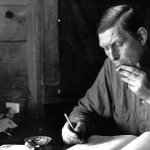(After Dr. Haase gave them shots of morphine, Magda gave each child an ampule of potassium cyanide from a spoon.)
This is the needle that we give
Soldiers and children when they live
Near the front in primitive
Conditions or real dangers;
This is the spoon we use to feed
Men trapped in trouble or in need,
When weakness or bad luck might lead
Them to the hands of strangers.
This is the room where you can sleep
Your sleep out, curled up under deep
Layers of covering that will keep
You safe till all harm’s past.
This is the bed where you can rest
In perfect silence, undistressed
By noise or nightmares, as my breast
Once held you soft but fast.
This is the Doctor who has brought
Your needle with your special shot
To quiet you; you won’t get caught
Off guard or unprepared.
I am your nurse who’ll comfort you;
I nursed you, fed you till you grew
Too big to feed; now you’re all through
Fretting or feeling scared.
This is the glass tube that contains
Calm that will spread down through your veins
To free you finally from all pains
Of going on in error.
This tiny pinprick sets the germ
Inside you that fills out its term
Till you can feel yourself grow firm
Against all doubt, all terror.
Into this spoon I break the pill
That stiffens the unsteady will
And hardens you against the chill
Voice of a world of lies.
This amber medicine implants
Steadfastness in your blood; this grants
Immunity from greed and chance,
And from all compromise.
This is the serum that can cure
Weak hearts; these pure, clear drops insure
You’ll face what comes and can endure
The test; you’ll never falter.
This is the potion that preserves
You in a faith that never swerves;
This sets the pattern of your nerves
Too firm for you to alter.
I set this spoon between your tight
Teeth, as I gave you your first bite;
This satisfies your appetite
For other nourishment.
Take this on your tongue; this do
Remembering your mother who
So loved her Leader she stayed true
When all the others went,
When every friend proved false, in the
Delirium of treachery
On every hand, when even He
Had turned His face aside.
He shut himself in with His whore;
Then, though I screamed outside His door,
Said He’d not see me anymore.
They both took cyanide.
Open wide, now, little bird;
I who sang you your first word
Soothe away every sound you’ve heard
Except your Leader’s voice.
Close your eyes, now; take your death.
Once we slapped you to take breath.
Vengeance is mine, the Lord god saith
And cancels each last choice.
Once, my first words marked out your mind;
Just as our Leader’s phrases bind
All hearts to Him, building a blind
Loyalty through the nation,
We shape you into a pure form.
Trapped, our best soldiers tricked the storm,
The Reds: those last hours, they felt warm
Who stood fast to their station.
You won’t curse how your hours were spent;
You’ll grow like your own monument
To all things sure and good,
Fixed like a frieze in high relief
Of granite figures that our Chief
Accepts into His true belief,
His true blood-brotherhood.
You’ll never bite the hand that fed you,
Won’t turn away from those that bred you,
Comforted your nights and led you
Into the thought of virtue;
You won’t be turned from your own bed;
Won’t turn into that thing you dread;
No new betrayal lies ahead;
Now no one else can hurt you.


















Comment form: